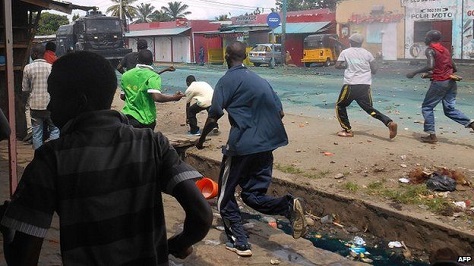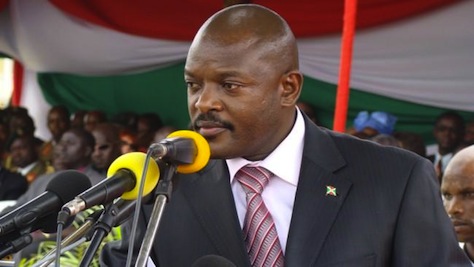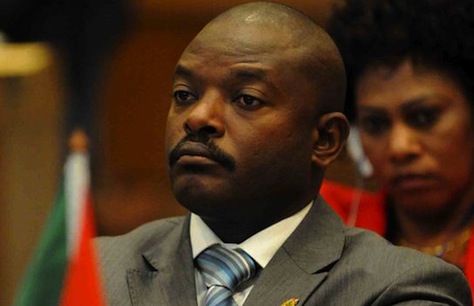It was all so very predictable and very preventable. ![]()
The decision by Burundian president Pierre Nkurunziza to seek a third term in the country’s upcoming May 26 elections is spawning a violent and deadly response in a country where Nkurunziza’s agreement to presidential term limits was a key element of the Arusha peace accords that ended the landlocked east African country’s civil war over a decade ago.
Amid growing repression in the last two years, and reports of intensified attacks at the hands of the Imbonerakure, a militia and youth wing of the country’s governing party, Nkurunziza’s push to win a third consecutive term in office now threatens to engulf the country once again in political violence that could morph into deeper ethnic conflict. Nkurunziza and his advisers are taking the position that because he was appointed to the presidency in 2005 and elected in 2010, he is technically entitled to run for a ‘second’ term in 2015. Nevertheless, political opposition figures and international observers alike disagree strongly with that rationale.
* * * * *
RELATED: As world remembers Rwanda genocide,
Burundi tilts into political crisis
* * * * *
With protesters defying government efforts to disperse crowds in the capital city of Bujumbura, a handful of people have already been killed, and aid workers report that hundreds of thousands are fleeing their homes. In addition, reports indicate that Burundi’s borders were being closed today to foreigners trying to enter the country, and the government is shutting down independent radio outlets.
I wrote last summer for The National Interest just how toxic a Nkurunziza reelection bid could become. Above all, the political instability exacerbates the lack of foreign investment in Burundi, which is one of sub-Saharan Africa’s poorest countries. Descent into further political chaos, and resulting internal displacements, would only emphasize the widespread poverty and lack of development throughout the country.
The best-case scenario for Burundi would be for Nkurunziza to rethink his reelection plans. It’s difficult to fathom that the governing Conseil National Pour la Défense de la Démocratie–Forces pour la Défense de la Démocratie (CNDD-FDD, National Council for the Defense of Democracy–Forces for the Defense of Democracy) would lose power, even without Nkurunziza leading it as a formal matter. Conceivably, Nkurunziza might even continue to exercise discretion over top government functions, even if he is no longer Burundi’s head of state.
If Nkurunziza goes forward for a third term, the opposition will almost certainly boycott the vote, as they did in 2010 when the process was deemed unfair and unfree. That’s not a great outcome, and it would invalidate the election, as a matter of international opinion. That, however, would still be much better than a slide into civil war. Avoiding further bloodshed as the 2015 vote approaches is more important than achieving a milestone for democracy in a country where democracy has never been a priority — and will not be a priority in the midst of a violent clash. The risk is that political confrontation will eventually mutate into the kind of ethnic hatred between the Hutu majority and the Tutsi minority that devastated neighboring Rwanda and culminated in the 1994 genocide. No one today believes that Burundi is necessarily destined for ethnic conflict, but a new civil war, based on either political or ethnic differences, should be a major concern for regional leaders.
Rwandan president, Paul Kagame, met with Nkurunziza earlier this month, ostensibly to discuss the rising number of Burundian refugees fleeing to Rwanda. But the term-limited Kagame has pledged to step down as Rwanda’s president in 2017, and there are already rumors he may seek to extend his own mandate. Tanzanian president Jakaya Kikwete in March warned Nkurunziza not to seek a third term, imploring him to respect the terms of the Arusha accords signed in Kikwete’s country a decade ago.


